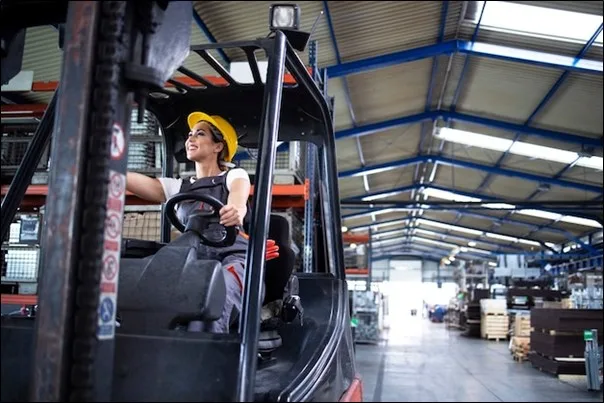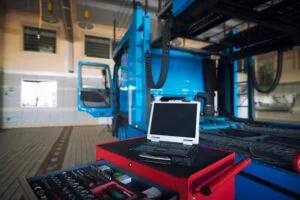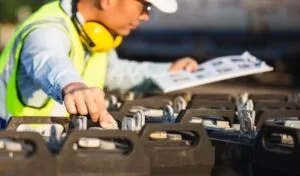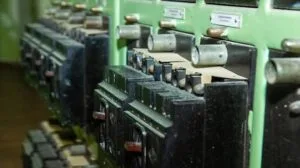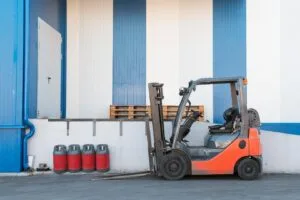Forklifts are an essential part of warehouse and industrial operations, helping businesses move heavy materials quickly and efficiently. But what powers these hardworking machines? The answer lies in forklift batteries, and over the years, these batteries have evolved significantly to meet the growing demands of the industry. Today’s forklift batteries are more powerful, longer-lasting, and energy-efficient than ever before, and the technology behind them is advancing rapidly.
In this blog, we’ll explore how forklift battery technology has changed over time, the latest innovations in forklift battery technology, and how these advances are helping businesses operate more efficiently. Whether you’re managing a small warehouse or a large industrial facility, understanding the evolution of forklift battery technology is crucial for making the best decisions about your equipment.
At Industrial Batteries Accessories Ltd., we are committed to providing the most advanced forklift battery solutions to help your business grow. Let’s dive into the latest forklift battery technology advances and how they can benefit your operation.
The Evolution of Forklift Battery Technology
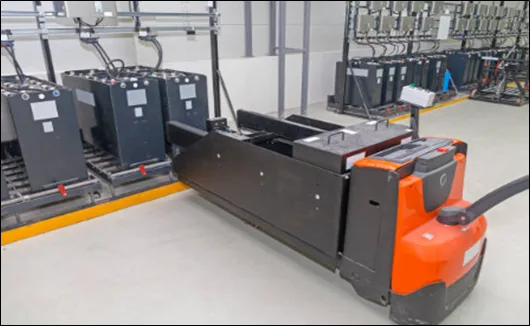
Forklift batteries have come a long way in terms of power, efficiency, and safety. Let’s take a look at how forklift battery technology has evolved over the years:
1. The Early Days of Lead-Acid Batteries
Lead-acid batteries have been used in forklifts for many years and are still a common choice in the industry. These batteries were the go-to option for many years because they are affordable and reliable. However, they have some limitations, such as the need for regular maintenance, shorter run times, and the release of gases during charging.
2. The Rise of Lithium-Ion Batteries
As the demand for forklifts that run longer and require less maintenance grew, lithium-ion batteries began to enter the picture. Lithium-ion technology offers several advantages over lead-acid batteries, including:
- Longer Lifespan: Lithium-ion batteries last much longer than lead-acid batteries, reducing the need for frequent replacements.
- Faster Charging: These batteries charge much quicker than lead-acid batteries, reducing downtime and increasing productivity.
- Energy Efficiency: Lithium-ion batteries are more energy-efficient, meaning they can handle more work without consuming as much power.
3. The Shift Toward Faster Charging Solutions
As industries demanded even greater efficiency, forklift battery technology started to focus on faster charging solutions. Today, some batteries are designed to charge in less than two hours, allowing businesses to reduce downtime and keep their operations running smoothly.
4. The Move Toward Eco-Friendly Solutions
With environmental concerns becoming more pressing, forklift battery technology is evolving to be more eco-friendly. Lead-free batteries, recyclable materials, and energy-saving designs are just a few examples of how manufacturers are addressing the environmental impact of forklift batteries.
Key Forklift Battery Technology Advances
Several exciting advances in forklift battery technology are helping businesses keep up with the increasing demands of the modern world. Here are some of the most important developments:
1. Advanced Battery Management Systems (BMS)
Battery management systems (BMS) are used to monitor the health of the battery, ensuring optimal performance and preventing issues like overcharging or overheating. Modern BMS technology can:
- Monitor battery health in real-time
- Extend battery life
- Increase energy efficiency
- Prevent damage from overcharging or deep discharging
With these systems, businesses can reduce maintenance costs and increase the reliability of their forklift fleets.
2. Wireless Charging Technology
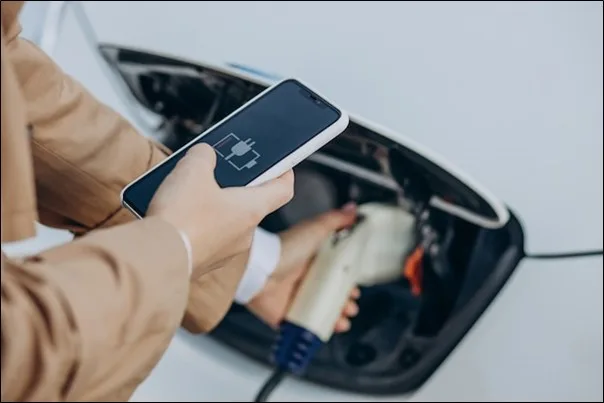
Another exciting development in forklift battery technology is wireless charging. This technology allows forklift batteries to charge without the need for direct physical connections. Wireless charging offers several benefits:
- Convenience: Operators don’t need to worry about plugging in batteries manually.
- Reduced Wear and Tear: Less handling means there is less chance of damaging the charging cables or connectors.
- Increased Safety: With wireless charging, there’s less chance of accidents or electrical mishaps during charging.
While wireless charging technology is still in its early stages, it has the potential to greatly improve the efficiency and safety of forklift fleets.
3. Super-Fast Charging Systems
In the past, forklift batteries needed several hours to recharge. However, with the introduction of super-fast charging systems, batteries can now be recharged in as little as one to two hours. This rapid charging process helps businesses minimize downtime and keep their operations running smoothly.
4. Battery Leasing and Swapping Programs
Battery leasing and swapping programs have become a popular solution for businesses that rely on forklifts. Instead of buying batteries outright, businesses can lease or swap batteries to ensure they always have fully charged ones available. This helps reduce upfront costs and makes it easier to maintain a large fleet of forklifts.
How Forklift Battery Technology Advances Are Helping the Industry
The latest forklift battery technology advances are helping businesses across industries operate more efficiently. Here are some of the ways these new technologies are benefiting operations:
1. Increased Productivity
With faster charging times, longer battery life, and energy-efficient designs, forklifts can work for longer periods of time without the need for breaks. This leads to increased productivity, as workers can use forklifts for longer shifts without worrying about battery power.
2. Reduced Maintenance Costs
Advancements in forklift battery technology, such as better battery management systems, mean that forklifts require less maintenance. Batteries last longer, charge faster, and are less likely to break down, which reduces overall maintenance costs for businesses.
3. Improved Safety
Battery management systems and wireless charging technology help ensure that forklifts operate safely and efficiently. With fewer opportunities for overcharging, overheating, or short-circuiting, businesses can reduce the risk of accidents and extend the life of their forklift batteries.
4. Eco-Friendly Operations
As businesses become more focused on sustainability, advanced forklift batteries that use recyclable materials and have lower energy consumption are a key solution. Eco-friendly battery technology helps reduce the environmental impact of forklift operations, supporting companies’ green initiatives.
How Industrial Batteries Accessories Ltd. Can Help
At Industrial Batteries Accessories Ltd., we are proud to offer the latest forklift battery technology to help businesses optimize their operations. Whether you’re looking for lithium-ion batteries, advanced charging solutions, or battery management systems, we provide the tools and expertise to support your fleet’s performance.
We are committed to helping businesses choose the best forklift battery technology to meet their needs, offering reliable solutions and guidance to maximize efficiency and productivity.
Forklift Battery Technology
| Battery Type | Technology Features | Advantages |
| Lead-Acid Batteries | Older technology, reliable but requires maintenance | Low cost, widely available |
| Lithium-Ion Batteries | Faster charging, longer lifespan, higher efficiency | Less maintenance, more efficient, longer lasting |
| Wireless Charging | Charges without cables, reduces wear and tear | Increased safety and convenience |
| Super-Fast Charging | Charges batteries in 1-2 hours | Reduces downtime, improves productivity |
Frequently Asked Questions (FAQs)
Q1: What is the lifespan of a forklift battery?
The lifespan of a forklift battery depends on the type. Lead-acid batteries typically last around 1,500 charge cycles, while lithium-ion batteries can last up to 5,000 cycles.
Q2: Are lithium-ion batteries better than lead-acid batteries?
Yes, lithium-ion batteries have several advantages over lead-acid batteries, including longer lifespan, faster charging, and reduced maintenance.
Q3: What is a battery management system (BMS)?
A BMS is a system that monitors the battery’s health, controls its charging, and ensures it is operating safely. It helps extend the battery’s life and improves efficiency.
Q4: What are super-fast charging systems?
Super-fast charging systems allow forklift batteries to be charged in 1-2 hours, significantly reducing downtime and increasing productivity.
Q5: How can wireless charging benefit my business?
Wireless charging eliminates the need for physical connections, reducing wear and tear on charging cables and increasing safety during the charging process.
Final Thoughts on Forklift Battery Technology Advances
Forklift battery technology continues to evolve rapidly, bringing new solutions that help businesses save money, increase productivity, and reduce their environmental impact. From longer-lasting lithium-ion batteries to faster charging systems and battery management solutions, the advances in forklift battery technology are designed to meet the needs of modern industries. At Industrial Batteries Accessories Ltd., we are here to help you stay on top of these innovations. By choosing the right forklift battery technology, you can boost your business’s efficiency and reduce operational costs. If you need more information or help selecting the best solution for your business, don’t hesitate to reach out!

